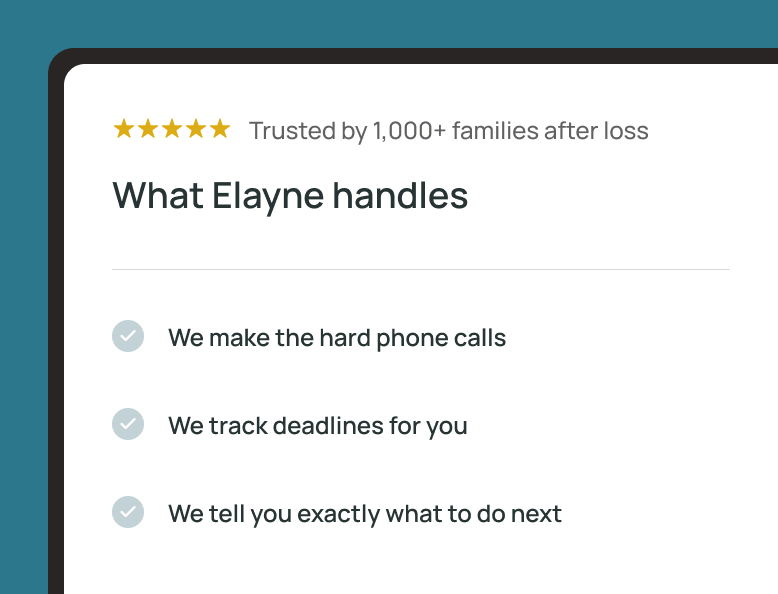Key Takeaways:
- Illinois allows heirs to use a Small Estate Affidavit for estates valued under $100,000, helping them avoid formal probate.
- You must wait 30 days after the decedent's death to use the affidavit.
- There’s no court hearing required, but the process involves strict documentation and eligibility rules.
When a loved one passes away in Illinois, the emotional toll is already significant. If they left behind a modest estate, especially one without real estate, you may not need to navigate the long and costly probate process. Instead, Illinois offers a simpler alternative: the Small Estate Affidavit.
This legal document helps families transfer property from a small estate without involving the courts. In this guide, we’ll explain how the Small Estate Affidavit in Illinois works, who qualifies, and how to complete and use it effectively.
What Is a Small Estate Affidavit?
A Small Estate Affidavit is a legal document that allows heirs to claim property from a deceased person's estate without going through formal probate.
Under Illinois law, a "small estate" is defined as:
- An estate with a gross value under $100,000, and
- No real estate included.
This tool is especially useful for distributing bank accounts, personal property, or unpaid wages without the delays and expenses of probate court.
Who Can Use It in Illinois?
To use the Illinois Small Estate Affidavit, you must meet certain conditions:
- You must be an heir or representative (such as an executor named in the will).
- The deceased must have lived in Illinois or passed away there.
- All debts of the estate must be resolved or clearly acknowledged in the affidavit.
- You must wait at least 30 days after the person’s death before executing the affidavit.
This ensures that any creditors have had adequate time to come forward.
Requirements for the Small Estate Affidavit
Before you begin, make sure your situation meets all Illinois Small Estate Affidavit requirements:
- The decedent was an Illinois resident or died in Illinois.
- The estate does not include any real estate (land or homes).
- The estate’s total value is under $100,000.
- If a will exists, it must be attached to the affidavit.
- You must include the names and relationships of all heirs and beneficiaries, even if they’re not claiming property.
Meeting these requirements is essential for using the affidavit legally and successfully.
How to Complete and Use the Affidavit
Here’s how to file a Small Estate Affidavit in Illinois:
- Obtain the official form.
You can download the form from the Illinois Comptroller’s website, your local county court website, or visit the probate division in person. - Complete the form accurately. Include:
- A certified copy of the death certificate.
- A list of all assets, such as bank accounts, vehicles, and personal property.
- Any debts owed by the estate.
- A complete list of heirs and beneficiaries.
- Sign and notarize.
All parties may need to sign under oath and have their signatures notarized. - Present the affidavit.
Take the completed affidavit and death certificate to banks, financial institutions, or employers to release or transfer the assets.
You do not need to file the affidavit with the court in most cases, which saves time and cost.
Benefits and Limitations
Using a small estate affidavit in Illinois comes with several advantages:
Benefits:
- Avoids probate court and associated legal fees.
- Faster access to assets—often within days after the 30-day wait period.
- Easier for surviving family members to settle modest estates.
Limitations:
- Cannot be used if the estate includes real estate.
- Not suitable if there are disputes among heirs.
- Strictly limited to estates under $100,000.
If these limitations apply to your situation, you may need to consult a probate attorney.
Common Mistakes to Avoid
To ensure a smooth process, avoid these common pitfalls:
- Filing too soon. Wait the full 30 days after death to use the affidavit.
- Ignoring debts. Creditors must be listed and addressed—leaving them out can lead to legal trouble.
- Overestimating eligibility. Don’t try to use the affidavit if the estate’s value exceeds $100,000 or includes a house.
- Omitting heirs. All legal heirs, even if disinherited, must be listed.
Honesty and accuracy are critical—falsifying or misusing the affidavit can result in legal penalties.
FAQs
Q: Do I have to file the Small Estate Affidavit with the court in Illinois?
A: No, you typically do not need to file it with the court. Just present it directly to institutions holding the assets.
Q: Can I use this if my parent owned a house?
A: No. If real estate is part of the estate, you’ll need to go through formal probate or another legal process.
Q: Where can I get the Illinois Small Estate Affidavit form?
A: You can find the form on the Illinois Comptroller’s website, your county probate court website, or by visiting the clerk’s office.
Q: What if there is a will?
A: A valid will should be attached to the affidavit. The named executor can act as the representative.
Q: What if two heirs disagree about the estate?A: The affidavit cannot be used in cases where there are disputes. In such situations, probate court intervention may be necessary.
The Small Estate Affidavit in Illinois offers a practical, efficient way for families to settle modest estates without the burden of probate. It can be a lifesaver during difficult times—saving money, reducing paperwork, and speeding up the transfer of property.
Follow the rules carefully, use accurate documentation, and don’t rush the process. With the right preparation, you can use this tool to handle an Illinois estate under $100,000 and avoid probate in Illinois with confidence.












































